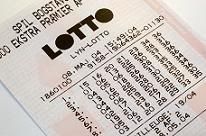The Lottery is a Tax
 I often quote a joke I heard one: “The lottery is a tax on people bad at math.” The odds of winning more money than you spend on the lottery are so low that the government is the only institution allowed to do it. We’re talking odds of millions to one depending on which game you like. The fact is that for every winner there needs to be tens of thousands of losers in order to finance the payouts. Yet every day people pay their money and play. So why do people play? Why am I tempted? Clearly something is out of balance. The desire to win millions of dollars overrides rational thought.
I often quote a joke I heard one: “The lottery is a tax on people bad at math.” The odds of winning more money than you spend on the lottery are so low that the government is the only institution allowed to do it. We’re talking odds of millions to one depending on which game you like. The fact is that for every winner there needs to be tens of thousands of losers in order to finance the payouts. Yet every day people pay their money and play. So why do people play? Why am I tempted? Clearly something is out of balance. The desire to win millions of dollars overrides rational thought.
I had a conversation with a co-worker once about the lottery. She kept saying “somebody has to win” and I kept replying “yes, but it won’t be you.” True $1 is certainly not very much to risk for the potential payout of millions. Even if you bought one ticket twice a week it would only be around $100 for the entire year, a small price to pay. But still the cold hard truth is that there are numerous other things more likely to happen to you. Lightning strikes, car accidents, falling objects, etc.
So why do people do it? What is it that is overriding their common sense? My guess is hope. For $1, I have the chance, however infinitesimally remote, that I might be able to quit my job and live like a king. I have the hope for a couple of days until the next drawing and then I have to pay for it again. Now $1 is not much to pay for hope, but it is also not likely to create any significant amount of it either.
So back to my other question, why am I tempted? Since Oklahoma is part of the Powerball now I see billboards telling what the current jackpot is up to. Once it gets close to $100 million, I start to think about dropping a dollar on the lottery. For some reason, that $100 million is the magic amount that starts to entice me, as if a paltry $26 million wouldn’t be enough for me. That little voice in my head says “C’mon, it is only $1.” The normal rational purchasing thoughts that I have immediately go out of balance and I find myself considering it. Last week, I could not care less about the lottery, but since it hits an arbitrary amount I’m suddenly thinking about how I would spend the money.
Eventually the feelings go away and I walk away without purchasing a ticket, but still it does show how easily our sense of balance can be thrown off. Wave a big enough potential payday in front of a normally person and suddenly they are rationalizing why it would be a dumb idea not to spend the money. Heck, Vegas is built on this principal. What we need are little warning flags in our head that pop up when these rationalizations start to occur so we can identify when our emotions are overtaking our logic and leading us to a bad decision. Once that flag is tripped we should step back and rethink our current course of action. That way we can avoid paying the “stupid tax” for our foolhardy ideas.
Posted: May 12th, 2008 under Decisions, Financial.
Comments: 2
Comments
Comment from Donald
Time: May 15, 2008, 12:42 pm
Hopes and dreams. Spending one or two bucks buys a few minutes of happy daydreams, of “What would my life be like if I scored that cash.” I think the arbitrary interest point is the real fraud. Sure there are benchmarks for “at this level I’ll be modestly comfortable for the rest of my life” and “this much or more and nobody in my family will ever have to work again” but an arbitrary amount of X dollars when half that would still change the lives of an entire family does not make much sense.
Comment from Mike Harmon
Time: May 12, 2008, 2:52 pm
I came across your blog on Technorati. Nice site layout. I will stop by and read more soon.
Mike Harmon